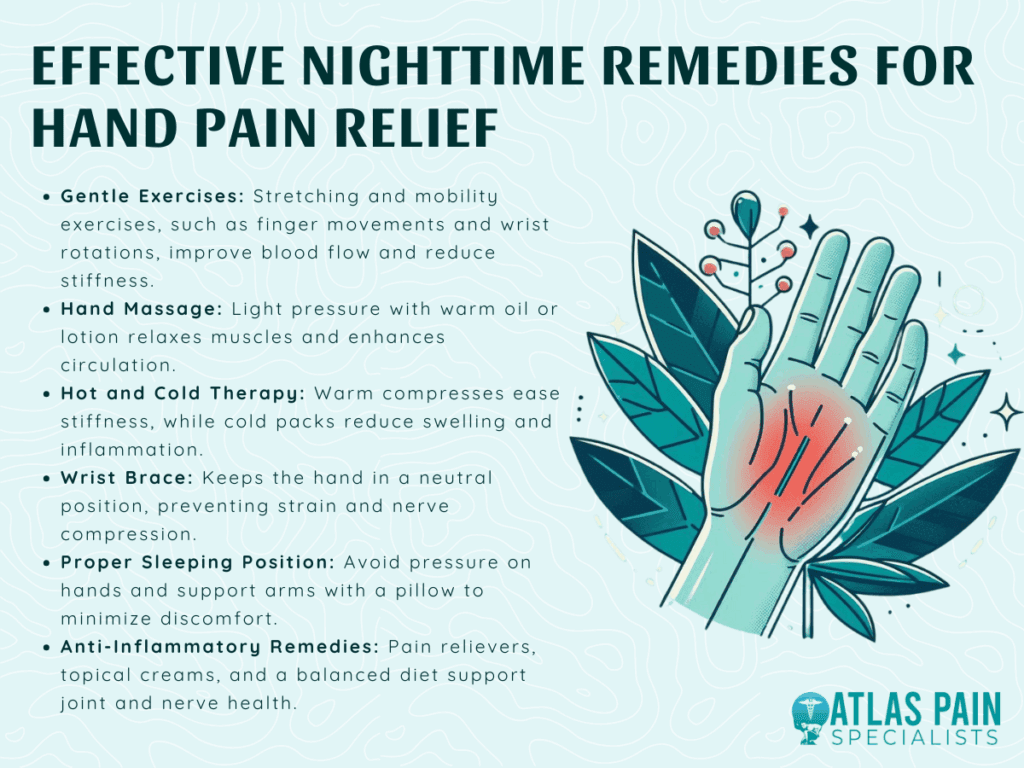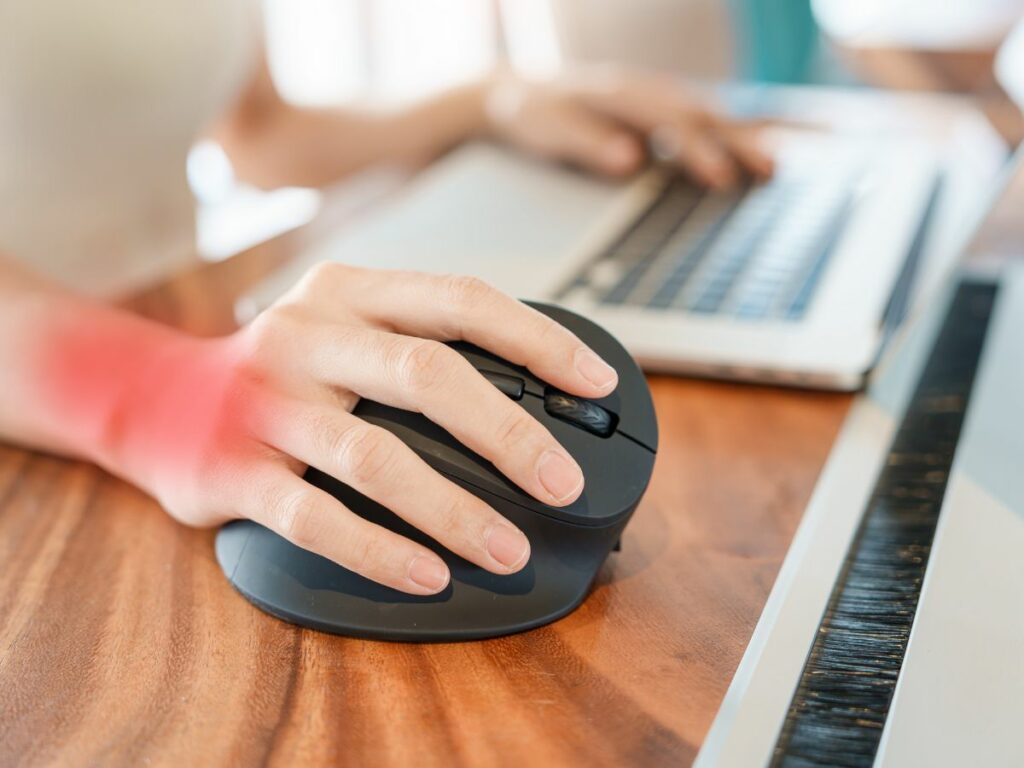

How To Relieve Hand Pain at Night with Simple Techniques
Waking up with aching, tingling, or stiff hands can be frustrating and disruptive to your sleep. Nighttime hand pain is often caused by conditions such as carpal tunnel syndrome, arthritis, nerve compression, or poor circulation. While occasional discomfort may not be a cause for concern, persistent pain can impact your daily activities and overall well-being. Understanding the reasons behind your hand pain is the first step toward finding relief.
This article explores the common causes of hand pain at night and provides simple techniques to ease discomfort. You’ll learn when it’s necessary to see a doctor and discover additional tips to help prevent and manage symptoms.
The Common Causes of Nighttime Hand Pain
Hand pain at night can be really frustrating and might be caused by different underlying issues. Figuring out what's behind the pain is important for finding the right relief and getting better sleep.
| Cause | Symptoms | Contributing Factors |
|---|---|---|
| Carpal Tunnel Syndrome | Numbness, tingling, pain in fingers (especially thumb, index, middle) | Repetitive hand use, wrist positioning, diabetes |
| Arthritis | Joint stiffness, swelling, pain (worse at rest) | Aging, inflammation, autoimmune conditions |
| Tendonitis | Pain with movement, tenderness, swelling | Repetitive gripping, overuse, strain |
| Poor Circulation | Cold hands, numbness, tingling | Vascular issues, sleeping position, diabetes |
| Nerve Compression | Burning, tingling, radiating pain | Pinched nerves, cervical spine issues, neuropathy |
Carpal Tunnel Syndrome
This condition occurs when the median nerve in the wrist becomes compressed, leading to numbness, tingling, and pain that often worsens at night. Repetitive hand movements, poor wrist positioning, or underlying health conditions like diabetes can contribute to its development.
Arthritis
Osteoarthritis and rheumatoid arthritis can cause joint inflammation, stiffness, and pain, which may intensify during rest. The lack of movement at night can lead to joint stiffness, making morning hand discomfort common.
Tendonitis
Overuse of the hand and wrist can lead to tendon inflammation, causing pain that becomes more noticeable at night. Activities like typing, gripping tools, or repetitive hand motions can strain the tendons, leading to discomfort.
Poor Circulation
Reduced blood flow due to conditions like peripheral neuropathy or vascular issues can result in hand numbness and pain while lying down. Sleeping in a position that compresses blood vessels may also contribute to nighttime discomfort.
Nerve Compression or Neuropathy
Conditions such as cervical radiculopathy (pinched nerves in the neck) or diabetic neuropathy can cause radiating pain, tingling, or burning sensations in the hands. These symptoms may worsen at night due to reduced movement and changes in body position.
Identifying the cause of nighttime hand pain is key to finding relief. Addressing underlying issues, adjusting sleep posture, and adopting hand-friendly habits can reduce discomfort and improve sleep quality.
Simple Techniques to Relieve Hand Pain at Night

Nighttime hand pain can be bothersome and interfere with sleep, but there are simple methods to alleviate the discomfort. By practicing gentle exercises, ensuring proper hand positioning, and following self-care strategies, you can minimize pain and enhance sleep quality. Here are a few easy techniques to help relieve it:
Gentle Hand Exercises
Stretching and mobility exercises help improve blood flow and reduce stiffness. Simple movements like opening and closing your fingers, wrist rotations, and tendon glides can prevent tension buildup before bedtime.
Hand Massage
Massaging your hands with light pressure can relax muscles, improve circulation, and reduce pain. Using a warm oil or lotion can enhance the soothing effect and promote relaxation.
Hot and Cold Therapy
Applying a warm compress or soaking your hands in warm water before bed can ease stiffness and relax muscles. If inflammation or swelling is present, alternating with a cold pack for 10 minutes can help reduce discomfort.
Wearing a Wrist Brace
A wrist brace keeps your hand in a neutral position, preventing nerve compression and reducing strain. This is especially helpful for conditions like carpal tunnel syndrome or arthritis.
Proper Sleeping Position
Keeping your wrists straight and avoiding pressure on your hands can prevent pain from worsening. Using a pillow to support your arms or adjusting your sleeping posture can help minimize discomfort.
Anti-Inflammatory Remedies
Over-the-counter pain relievers like ibuprofen or applying topical creams with menthol or capsaicin can help manage pain. Staying hydrated and maintaining a balanced diet can also support overall joint and nerve health.
By incorporating these simple techniques into your nighttime routine, you can ease hand pain and improve your sleep quality. If pain persists or worsens, consult a healthcare professional for further evaluation and treatment.
When to See a Doctor for Hand Pain at Night
Occasional hand pain at night is common, but persistent or worsening symptoms may indicate an underlying condition that requires medical attention. Knowing when to seek professional help can prevent long-term complications and ensure proper treatment.
| Symptom | Possible Cause | Action Needed |
|---|---|---|
| Severe, persistent pain | Arthritis, nerve damage | Medical evaluation, imaging tests |
| Frequent numbness/tingling | Carpal tunnel, neuropathy | Nerve tests, ergonomic adjustments |
| Swelling or joint deformity | Arthritis, inflammation | Blood tests, anti-inflammatory treatment |
| Pain radiating to arm/shoulder | Pinched nerve, cervical radiculopathy | Physical therapy, nerve studies |
| Difficulty gripping objects | Muscle weakness, nerve compression | Strength tests, possible surgery |
Severe or Persistent Pain
If hand pain lasts for weeks or becomes more intense despite home remedies, it may indicate a chronic issue like arthritis, carpal tunnel syndrome, or nerve damage. A doctor can perform tests to determine the cause and recommend appropriate treatment.
Numbness, Tingling, or Weakness
Frequent numbness, tingling, or loss of strength in your hands may be a sign of nerve compression or neuropathy. If these symptoms interfere with daily activities or worsen at night, medical evaluation is essential.
Swelling or Deformity
Unexplained swelling, redness, or visible changes in hand shape may indicate inflammation, infection, or joint disease. A doctor can diagnose the underlying cause and provide treatment to prevent further damage.
Pain That Radiates to Other Areas
If hand pain extends to your wrist, arm, or shoulder, it could be linked to a pinched nerve or another systemic issue. Seeking medical advice can help identify the root cause and prevent further complications.
Difficulty Performing Daily Tasks
If hand pain makes it difficult to grip objects, write, or perform everyday tasks, a professional evaluation is necessary. Early intervention can prevent worsening symptoms and improve hand function.
If nighttime hand pain is affecting your quality of life or not improving with self-care, it's time to see a doctor. Proper diagnosis and treatment can help manage symptoms effectively and prevent further complications.
Additional Tips to Relieve Hand Pain at Night
In addition to basic remedies, making small lifestyle adjustments can further help alleviate nighttime hand pain. These extra steps can improve comfort, reduce inflammation, and promote long-term hand health.
- Maintain Good Posture During the Day
Poor posture, especially while using a computer or phone, can put strain on your hands and wrists. Keeping your wrists in a neutral position and taking breaks from repetitive tasks can prevent excessive stress buildup.

- Use Ergonomic Tools
Switching to ergonomic keyboards, mice, and wrist supports can reduce strain on your hands. If your job or daily activities involve repetitive motions, ergonomic tools can help maintain a natural hand position.

- Stay Hydrated and Eat an Anti-Inflammatory Diet
Dehydration and a poor diet can contribute to joint pain and inflammation. Drinking plenty of water and consuming foods rich in omega-3 fatty acids, turmeric, and leafy greens can support joint health.


- Stretch and Move Throughout the Day
Incorporating hand and wrist stretches into your daily routine can keep your joints flexible. Regular movement prevents stiffness and reduces the chances of pain worsening at night.
- Reduce Stress and Tension
Stress can cause muscle tightness, which may contribute to hand pain. Practicing relaxation techniques like deep breathing, meditation, or yoga can help reduce overall tension in the body.
- Use Supportive Bedding and Pillows
A supportive pillow or mattress can prevent awkward sleeping positions that strain your hands. If needed, placing a small pillow under your wrist can help keep your hands in a comfortable position while sleeping.
By incorporating these additional tips into your routine, you can further reduce nighttime hand pain and improve your overall comfort. If pain persists despite these efforts, consulting a healthcare professional is the best course of action.
Conclusion
Hand pain at night can be disruptive, but understanding its causes and using simple techniques can make a significant difference. Whether it's due to arthritis, nerve compression, or repetitive strain, addressing the root cause is key to long-term relief. By incorporating exercises, proper hand positioning, and self-care strategies, you can reduce discomfort and improve your sleep quality.
If your symptoms persist, worsen, or interfere with daily activities, seeking medical advice is essential. A healthcare professional can diagnose the underlying issue and recommend appropriate treatment. With the right approach and lifestyle adjustments, you can keep your hands healthy, pain-free, and well-rested.
About Dr. Sean Ormond



